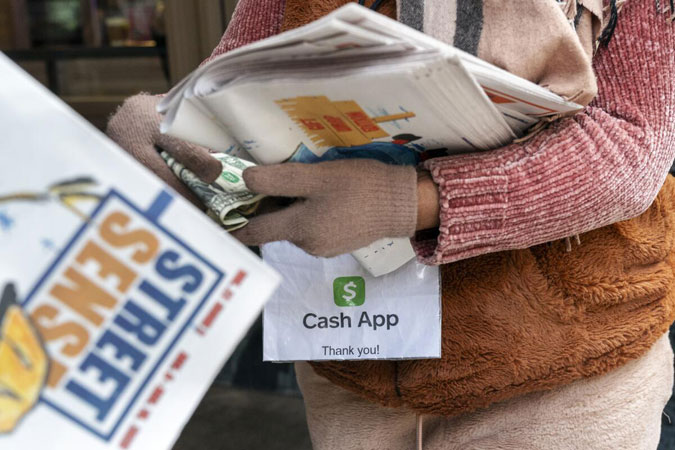Technology built the cashless society. Advances are helping the unhoused so they’re not left behind

Today, he’s finding fewer people are walking around with spare change. Even well-meaning individuals who want to help are likely to pat their pockets and apologize, he said.
“I would be out here for six or seven hours and wouldn’t get more than $12 to $15,” said Littlejohn, 62, who was homeless for 13 years. “People are like, `I don´t leave the house with cash.'”
But just as technological shifts helped create the problem, further advances are now helping charitable groups and advocates for the unhoused reach those most in danger of being left behind in a cashless society. A special Street Sense phone app allows people to buy a copy electronically and have the profits go straight to him. Thanks to Social Security and his income from Street Sense and other side gigs, Littlejohn now has his own apartment. One of the larger shifts in Western society over the past two decades has been the decline of cash transactions. It started with more people using credit cards to pay for things as trivial as a cup of coffee. It accelerated as smartphone technology advanced to the point where cash-free payments became the norm for many.
This shift has been felt keenly in the realm of street-level charitable giving – from individual donations to panhandlers and street musicians to the red Salvation Army donation kettles outside grocery stores.
“Everybody just has cards or their phones now,” said Sylvester Harris, a 54-year-old Washington native who panhandles near Capital One Arena. “You can tell the ones who really do want to help you, but even they just don’t have cash anymore.”
The cashless world can be particularly daunting for the unhoused. While electronic payment apps such as PayPal or Venmo have become ubiquitous, many of these options require items beyond their reach – credit cards, bank accounts, identification documents or fixed mailing addresses.
Charities have struggled to adapt. The Salvation Army has created a system where donors can essentially tap their phones on the kettle and pay directly.
Michelle Wolfe, director of development for the Salvation Army in Washington, said the new system is only in place in 2% of the collection kettles in the greater Washington area, but it has already resulted in increased donations. The minimum cashless donation is now $5, and donors routinely go as high as $20, Wolfe said.
At Street Sense, similar advances were necessary to keep up with changing consumer habits. Around 2013, executive director Brian Camore said he started receiving “anecdotal reports left and right” from vendors saying people wanted to buy a copy but had no cash. Each vendor purchases the copies from Street Sense for 50 cents and sells them for $2.
“We were losing sales and had to do something about it,” he said. “We recognized that the times were changing, and we had to change with them.”
Eventually he heard about an affiliate paper in Vancouver that had developed a cashless payment app and licensed the technology. Vendors can now redeem their profits at the Street Sense offices.
Leave a Comment